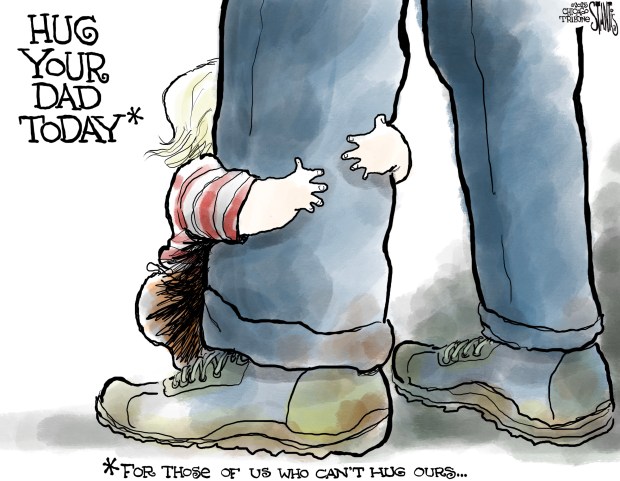So now what we long have feared has broken out into the open: war raging between Israel and Iran.
No more talk of proxy war, of how the strings of the terrorist groups known as Hamas and Hezbollah were being pulled by their Iranian paymasters, a reality widely contested by naive campus protesters not focusing on the bigger picture. Now the world has to face Iran shooting missiles directly at the heart of Israel, a nation it loathes and yet one of the United States’ most important allies. This is not a positive development, to say the least. Not for anyone.
Ever since Oct. 7 of last year, political rhetoric inside the U.S. has revolved around the fear of a broader conflict, of trying to stave off escalation, of trying to avoid others being brought into what needed to be contained as a regional conflict. Well, Iran has now directly attacked Israel and that nation, which has grown yet more unified and emboldened in recent days, appears in no mood to back down. Many there sense a once-in-a-generation chance to reorder everything related to the nation’s security. They may well be right. Momentum has moved in that direction, but at what human cost?
This is perhaps an inevitable outcome of what has been simmering since Hamas terrorists showed up at an Israeli music festival and several kibbutzim and killed most any Israeli they could find. Either that or the terrorists took their prey hostage so as to be able to wage yet more horrors upon their persons and their families. That grievous attack was the first domino, not that any of the players here can agree on where the true beginning lies. But it unleashed new horrors. That we should all agree on.
Tuesday’s shocking events follow the audacious Israeli attacks on Hezbollah, staggeringly effective military operations in Lebanon that first took out many individual fighters by booby-trapping their communications devices and then bombed the group’s leadership, killing Hassan Nasrallah, the powerful secretary-general of Hezbollah, on Sept. 27. Also killed in that attack was Ali Karaki, commander of Hezbollah’s southern front. In a space of little more than a week, The Associated Press reported, at least seven senior Hezbollah commanders have been eliminated in Lebanon.
These attacks were conducted with surgical precision, an extraordinary collective military accomplishment, if that’s ever the right word for killing people (with video images available as proof). The AP noted that many of these powerful men had evaded both death and detention not just for years, but in some cases for decades. To say these were extraordinarily successful and surgical operations is to understate. But that success is dangerous for world peace. That’s the paradox with which we must wrestle.
For on Tuesday, Iran struck back, dispatching scores of missiles, many of them ballistic missiles, hurtling toward Israeli cities, including Tel Aviv. Hundreds of sirens went off and thousands of Israelis rushed to bomb shelters. While Israeli media reported no one was killed, there were some direct hits, and news reports cited a Palestinian worker from Gaza being killed by fragments of rockets that fell in Jericho in the West Bank.
Israel still took that barrage as a clear declaration of war by Iran, no room for interpretation, and vowed retaliation.
Meanwhile, bombs are not the only things Israelis have to fear. On Tuesday night, at least six people were killed and at least nine wounded in a terror attack on people waiting for a train in Jaffa. Reportedly, the two attackers were then shot dead, not just by security personnel but tellingly by citizens using their personal firearms.
By Tuesday night, the talk in some Israeli media was of targeting Iranian leadership, which could well mean bombing governmental locations.
Iran also rattled its sabers and made clear, not that we doubted it, that it had many more lethal weapons still at its disposal. “Should the Zionist regime dare to respond or commit further acts of malevolence, a subsequent and crushing response will ensue,” Iran’s mission to the United Nations wrote in a deeply unsettling Tuesday night post on the social platform X. “Regional states and the Zionists’ supporters are advised to part ways with the regime,” the post continued, making a clear threat to Israel’s allies.
What now? It is hard to say. Things are out of control and further agony in the region looks inevitable.
This must command the immediate attention of a Biden administration that has paid a price for the politically motivated softness of its support for Israeli efforts to get its hostages out of Gaza, albeit at the massive cost of further suffering for the Palestinian people. By many accounts, the White House has not been much in the loop. And when you are not in the loop, you lose influence at the most important times.
That’s just one of the agonizing dilemmas here, along with the sense that the U.S. has simply lost track of what is going on in a region that has moved steadily away from peace. Now Israel’s allies essentially have to say there will be severe consequences for Iran as a result of these attacks, even as they also call for a cease-fire that does not look to be coming anytime soon.
Israel has taken out the proxies of the Iranian regime with apparent ease. And now that the main sponsor of those groups has shown its hand and intentions, the clear scenario is that the two principals in this fight all along will choose to keep going. Their argument is over matters for which there is no easy or clear resolution.
“I’m clear-eyed Iran is a destabilizing, dangerous force in the Middle East,” Vice President Kamala Harris said Tuesday, and she is correct there. But we’re all clear-eyed on that front now. The question is what to do about that “destabilizing, dangerous force.” It’s no longer about identification or even reaction. It’s about finding a resolution that halts the trajectory of this conflict from local to regional to, heaven forfend, global.
Anyway, we are still on President Joe Biden’s watch and this situation clearly should be more than enough to occupy him through the end of his term. He has to stand by Israel, but that’s not the whole task.
Any burnishing of legacy will have to wait. Global crises do not unfold according to U.S. election cycles. That much became even clearer on Tuesday.
Biden has a big job left to do right now.
Submit a letter, of no more than 400 words, to the editor here or email letters@chicagotribune.com.




